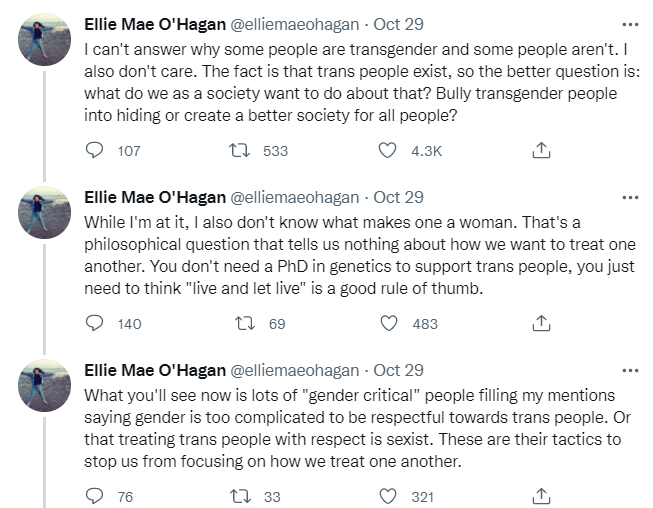What does "respect trans people" mean?
Respect for individuals, respect for the right to hold extraordinary beliefs, or respect for the content of those beliefs?
There's a difference between respecting people as individuals, respecting people's right to believe extraordinary things, and respecting the content of other people's beliefs.
You can respect trans people as individuals and respect their right to believe extraordinary things about sex and gender while rejecting the content of their belief system about gender.
Especially when trans activists don't just want to be free to believe extraordinary things about sex and gender (which, of course, they are entirely free to do), but want everybody else to act as though they believe these things, too: without evidence, without inquiry, without debate.
It's not hateful to debate, criticize, and reject the content of someone else's belief system, especially when that belief system tries to compel your allegiance and affects your life by redefining sex in the law, putting males in women's spaces and sports, policing women's speech, and hounding women who don’t comply out of the public sphere.
The conflict we're having isn't about respecting individuals as fellow human beings or respecting the right to hold extraordinary beliefs about gender and sex. The conflict is over the imposition of this fringe belief system in law and society, at the expense of sex-based rights.
Again, since this seems very difficult for trans activists to grasp:
I believe people who identify as trans exist and deserve the same basic rights and protections that all human beings do. It's not necessary for me to personally believe in gender identity to respect trans people as individuals.
Gender identity is a deeply held belief for some people, who may be offended when this belief is held up for scrutiny. The possibility that believers may be offended by scrutiny of their belief system does not impose any obligation on nonbelievers not to scrutinize.
This is particularly clear in cases where believers attempt to impose their beliefs on the rest of society, as in the campaign to overwrite sex with gender identity. Open, liberal societies scrutinize and debate issues. That's how we decide how to move forward.
It's not necessary for the law to equate sex and gender identity to protect trans people's basic rights. Resisting the false equation of sex and gender identity is not denying recognition to trans people: it's preserving the ability of the law to recognize sex. This matters because sex matters. When law and society treat some males as though they were female, that undermines the existing, hard-won, and — by the way — still needed rights of women and girls.
Alternative frameworks exist that protect trans rights that do not require the false equation of sex and gender identity and do not compel belief in gender identity. Let’s explore those.




